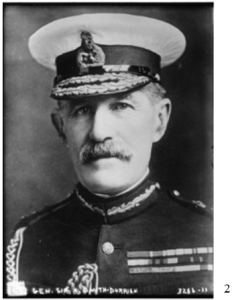Sunday, April 11, 1915
Billets, Cassel
The Battalion War Diarist wrote for this day: “All ranks resting. Inspection 3rd Brigade at Bde. H.Q. in morning by Gen. Sir. H. Smith Dorrien, who was very complimentary in his remarks.” [1]
THIS DAY IN RMR HISTORY: “General Sir Horace Lockwood Smith-Dorrien, GCB GCMG DSO ADC (26 May 1858 – 12 August 1930) was a British soldier. One of the few British survivors of the Battle of Isandlwana as a young officer, he also distinguished himself in the Second Boer War.

He held senior commands in the BEF during the First World War. He commanded the British II Corps at the Battle of Mons, the first major action fought by the BEF, and the Battle of Le Cateau, where he fought a vigorous and successful defensive action contrary to the wishes of the Commander-in-Chief Sir John French, with whom he had had a personality clash dating back some years. In the spring of 1915 he commanded British Second Army at the Second Battle of Ypres. He was relieved of command by French for requesting permission to retreat from the Ypres Salient to a more defensible position.” [3]
“Sir Horace Smith-Dorrien, commanding II Corps, was a determined soldier of considerable ability. A fighting soldier with a minimum of staff experience, ‘Our “Orace”’ was greatly admired by his soldiers. Unlike Haig and Joffre, who both maintained an exterior calm under the most trying conditions, Smith-Dorrien’s temper was usually on a short fuse and he could explode in violent rage with apparently little provocation.” [4]
[1] War Diary, 14th Canadian Battalion, The Royal Montreal Regiment, April 11, 1915. Library and Archives Canada, Ottawa, http://data2.collectionscanada.ca/e/e044/e001089714.jpg
[2] Wikipedia contributors, "Horace Smith-Dorrien," Wikipedia, The Free Encyclopedia, http://en.wikipedia.org/w/index.php?title=Horace_Smith-Dorrien&oldid=630530507 (accessed February 3, 2015).
[3] Ibid
[4] David Lomas, “First Ypres 1914: The Graveyard of the Old Contemptibles,” Oxford, Eng., Osprey Publishing, 1999, pg.14.

